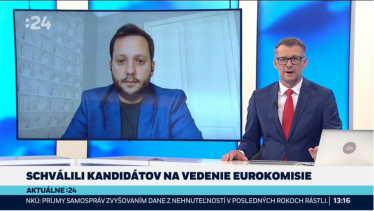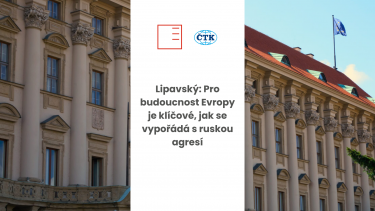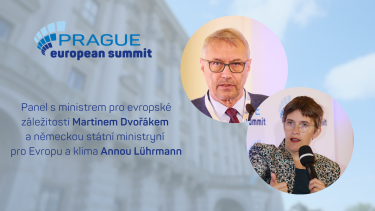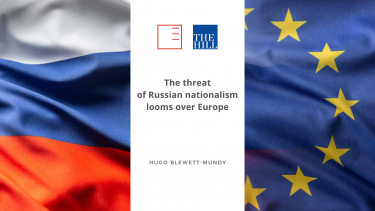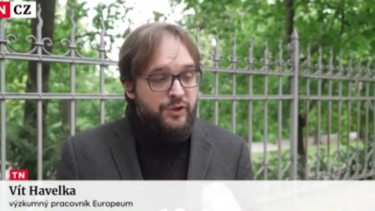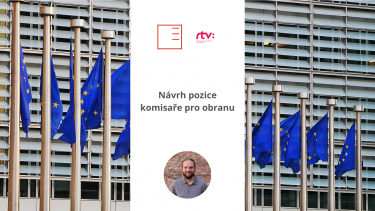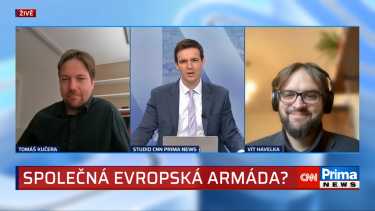RTVS | EU and Ukraine have concluded a comprehensive security agreement in Brussels
The European Union and Ukraine concluded a comprehensive security agreement in Brussels. This builds upon the EU's longstanding support for Ukraine. What did the politicians agree upon? What is new in the new treaty? Žiga Faktor, Deputy Director and Head of the Brussels Office at the EUROPEUM Institute, commented for the Slovak RTVS.
Show more
ČTK | Lipavský: Dealing with Russian aggression is key for the future of Europe
According to Minister of Foreign Affairs Jan Lipavský, it is crucial for the future of Europe how it deals with Russia's brutal aggression towards Ukraine and its increasingly aggressive stance towards the West. He also emphasized that it will be essential for the European Union to ambitiously strengthen its role as a global player in the coming period, including prompt action in the development of the defense industry. He presented this vision in his speech at the Prague European Summit co-organized by EUROPEUM Institute and the Institute of International Relations.
Show morePES 2024 | The EU must cooperate not only militarily, but also to defend itself against cyber attacks from Russia, said Minister Dvořák at the conference
The second day of the Prague European Summit 2024 conference at the Czernin Palace was opened with a speech by Czech Minister for European Affairs Martin Dvořák. He thinks of the enlargement of the European Union as crucial. "We have to realize that the enlargement of the EU, our defense and security and the current Central European position are interconnected," he said.
Show moreThe Hill | The threat of Russian nationalism looms over Europe
The threat of Russian nationalism poses a serious danger to Europe, as emphasized by the EU's High Representative for Foreign Affairs and Security Policy Josep Borrell in his speech in April. Russia is attempting to reassert its influence, particularly through its war against Ukraine, which undermines European security. What impact does the reemergence of Russian nationalism, supported by China, have on European security, and how should the West respond to this geopolitical reality? In his commentary for the American news website The Hill, Hugo Blewett-Mundy, an external collaborator and research fellow at EUROPEUM Institute, addresses this topic.
Show moreTelevizní noviny | Do the EU elections have the potential to change the support of Ukraine?
There have been opinions that call for changes of the EU including defense cooperation or foreign policy. The topic that should stay important even after the EU elections is the support of Ukraine. Do the EU elections have the potential to change the intensity of the EU's support of Ukraine? Vít Havelka, a senior researcher at EUROPEUM Institute answered for the main evening broadcast of TV Nova.
Show more
RTVS | Proposal for the position of Commissioner for Defense
The current President of the European Commission, Ursula von der Leyen, proposes the creation of a new position: Commissioner for Defense in the future Commission. Is this proposal feasible? When could this position be established? And who would fill it? How would enhanced EU defense operate alongside NATO was addressed by Vít Havelka, Senior Researcher at EUROPEUM Institute, in a commentary for the Slovak television RTVS.
Show more
CNN Prima News | The European Army and the position of the Defense Commissioner
The next European Commission should have a new Commissioner for Defense. There is speculation that this position could go to the Czech Republic. However, some European politicians, such as French President Emmanuel Macron, are calling directly for the creation of European army. But what are the pitfalls of the project? Vít Havelka, a research fellow at EUROPEUM Institute, talked about the usefulness and possibilities for CNN Prima News.
Show more
TA3 | Results of the extraordinary summit in Brussels
At the extraordinary summit of European Council in Brussels, the original economic debates quickly turned to serious geopolitical issues, such as the extension of sanctions against Iran and the strengthening of Ukrainian air defenses. However, as pointed out by Vít Havelka for Slovakian TA3, an analyst at the EUROPEUM Institute, there is no fundamental shift in the EU's approach to countries such as Russia, Israel or Iran.
Show more
TV Nova | European elections: Defense, security and domestic issues dominate amongst Czech voters
According to surveys a record turnout of Czech voters is expected in this year's elections to the European Parliament. Compared to the elections in 2014, it could be almost double the number, and so far about 33 percent participation is expected. Defense and security will be key topics, as well as war in Ukraine. Domestic issues of individual countries will play an important role as well. The executive director of the EUROPEUM Institute, Martin Vokálek, spoke to TV Nova about possible changes in the composition of the Parliament.
Show more
Euractiv | Strengthening ammunition production through the new European Defence Industrial Strategy
The new European Defence Industrial Strategy primarily responds to the Ukrainian need for ammunition supplies due to Russian invasion. It includes measures such as support for collective procurement of defense systems, focus on the involvement of European firms in public tenders, support for national budgets in transitioning to new weapon systems, and the development of stronger ties with Ukraine and NATO. Zuzana Krulichová, a researcher specializing in European defense policy at EUROPEUM Institute, commented on the funding of the new strategy for Euractiv.
Show more
Staroměstské náměstí 4/1
Prague 1 - Staré Město
110 00
tel.: +420 212 246 552
email: europeum@europeum.org
https://www.europeum.org
